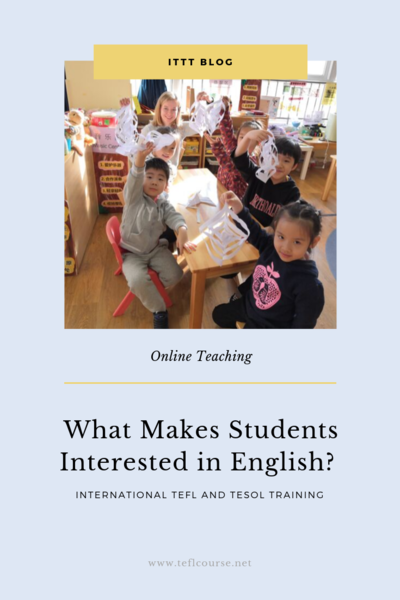What Makes Students Interested in English?

Whether a large class, a single student, with children, business people, online, or in person, a teacher needs to form a bond between them and their students. Though every class has different needs and methods to be taught, the teacher's ability to create trust and assist in the student's learning starts during the first interaction and carries on throughout all subsequent lessons. As such, establishing rapport with students helps not only with warming up the students to their ability to learn the subject, but also to improve themselves as well.
Table of Contents
When is the relationship being built?
Do you want to teach English abroad? Take a TEFL course!
This post was written by our TEFL certification graduate Andrew S. Please note that this blog post might not necessarily represent the beliefs or opinions of ITTT.
Power of the First Impression
The first meeting between a student and their teacher will shape how willing and open a student is willing to learn a new subject. In the case of teaching English as a second language, the more successful the initial interaction, the easier they are to opening themselves up and acquiring vocabulary and grammar. To build this trust a teacher may simply have icebreakers and introductions during the first lesson and not necessarily focus on the subject at hand. Getting to know one another, no matter the setting will allow the learner to have a stronger bond with the teacher, making them more accessible to the lessons during later meetings.
This first lesson can also be used to assess how much the student may already know and allow the teacher to develop lesson plans around the individual or group of students, to have them learn at the right level. For example in English learning, if most of the students have a firm grasp on the different colors, the teacher can use this to apply their knowledge to animals and ease them into new vocabulary and sentence structure.
Also Read: Teacher's Confidence in Different Types of Classrooms
When is the relationship being built?
This establishment of rapport will carry on in later lessons and should be built upon. In doing so, the trust will build during successful lessons and interactions so the classroom remains interactive and engaged for the remainder of the course. For teaching English, later lessons will often be more difficult than earlier ones, requiring the students to have more faith in the teacher. Younger learners of English may need more assistance in understanding more abstract concepts, which allows the teacher to help develop the minds of children, or older learners may need assistance in the business aspect of the world, helping their socioeconomic standing of their home country. Focusing on the needs of each group is gradually built on in the following lessons, which keeps trust between the teacher and students.

Also Read: Should I take a TEFL course online or in a classroom?
What is trust for?
This trust allows the teacher and student to not be two separate groups but rather a whole. Allowing yourself to be seen as more than just a teacher allows students to remain invested in their lessons and classwork. If asked a difficult question a teacher may not know the answer to, the best course of action is to simply state, "I don't know, but I'll find out for you." Though a teacher may seem like an endless source of knowledge, the teacher is just as much of a human as the students are. A teacher that is willing to learn shows students that they are allowing themselves to be wrong or uninformed about a certain subject that learning will take place over the entirety of their lives. This simple gesture allows respect and trust to form stronger between both sides and is all based on the initial bond formed on the first day.
Do you want to teach English abroad? Take a TEFL course!
Establishing rapport is much more than creating a firm teacher-student relationship. It's a bond that impacts students of all backgrounds and ages, forming a trust that will impact them long after the classroom. A teacher's job does not end after the bell rings for the day, school lets out for summer, or even after a student graduates. It continues throughout the student's life, as the lessons were not simply just to learn English or any other subject. Starting from that first meeting, it was learning how to trust, give respect, and to be human.
Apply now & get certified to teach english abroad!
Speak with an ITTT advisor today to put together your personal plan for teaching English abroad.
Send us an email or call us toll-free at 1-800-490-0531 to speak with an ITTT advisor today.
Listen to this blog post
Related Articles:
- 10 Tips for Teaching Grammar to EFL Students Abroad
- Top 10 Things To Know When Moving Abroad To Teach English
- 4 Top Tips For Getting Your TEFL Certificate on the Road
- What TEFL course is most useful?
- What's Stopping You from Teaching English Abroad?
- The Best Countries to Teach ESL When You're 50+




